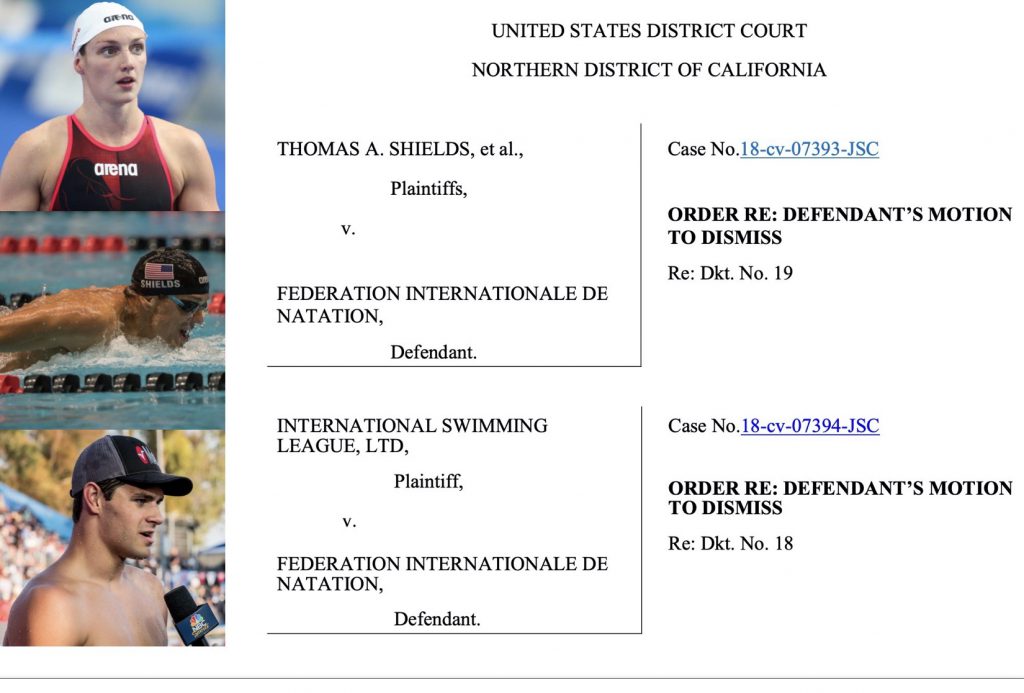International Swimming League Updates Legal Claims With Copycat Charges Against FINA

- Thomas Shields, et al. v. FINA, Case No. 18-cv-07393
- International Swimming League, Ltd. v. FINA, Case No. 18-cv-07394
The International Swimming League has officially added a copycat charge to its complaints against FINA in the latest developments in its legal action at the U.S. District Court for the Northern District of California.
The process is in its relative infancy yet: a formal discovery process is now underway, a trial scheduled for January 2022.
On December 16 last year, the court denied FINA’s motion to dismiss the cases brought by the ISL and, in parallel action, triple Olympic champion Katinka Hosszu, of Hungary, and USA teamsters Tom Shields and Michael Andrew, in 2018.
Updated claims lodged with the court 10 days ago include ISL’s view that FINA misappropriated the League’s format by aligning its competition and prize schedules to those already announced by the ISL.
FINA has three weeks to answer the claims, which chronology stretches to this: a charge of hindsight that attempted to circumnavigate the legal challenge in play. Only when the ISL initiated a legal challenge did FINA withdraw threats of sanctions against national governing bodies if they did not in turn impose sanctions on swimmers under their jurisdiction for associating themselves with a non-affiliated organisation, namely the League.
Plaintiffs identify specific correspondence from FINA Executive Director Cornel Marculescu culminating in a June 5, 2018 letter in which USA Swimming was pressured to break ties with ISL.
The detail of the updated claims from ISL, including exchanges between Marculescu and Mike Unger at USA Swimming, note that the ISL was unable to enter into partnership as co-organisers of competition with British Swimming and the Italian swimming federation, Federazione Italiano Nuoto (FIN). That, says the ISL, came down to the FINA threats that extended to their influence on USA Swimming: once the leading swim nation of the world shied away from doing business with ISL because of FINA insistence, then it was obvious that other federations would do likewise.
The ISL had planned to hold what was widely regarded as a test event for its League format in Italy in late 2018 but the FINA threats forced cancellation: FIN issued a statement to say that it would not put the status of its swimmers, who might end up being barred form international competition, at risk.
A London gathering of more than 30 Olympic and World champions, podium placers and World Record holders in December 2018 sent a stark message to FINA backing up the legal claims that had been lodged against it: ban us if you dare, we will be racing in the League.
The League went ahead, its first season trophy going to Energy Standard by a tight margin over London Roar after a series of seven events of the first eight multi-national Pro-Teams in swimming history.
It was only after the ISL event had been cancelled and swimmers made their stand in London that FINA announced a Champions Swim Series that mimicked many of the format innovations announced by the League, including no heats, straight showdown, a strict time-limit on the length of sessions and a similar prize structure.
FINA argues that clarification provided on January 15, 2019, that swimmers could compete in events organised by non-affiliated organisations such as the ISL would not be in violation of FINA rules nor sanctioned. That, says FINA, makes ISL claims moot. The position does not address the claim of hindsight when legal action was already in play, is the ISL’s retort.
The court rejected the FINA argument on that score, its 44-page Order concluding in a rejection of FINA’s motions to dismiss the cases.
The plaintiffs cite a copycat event as having taken place May 31 and June 1, 2018, in Indianapolis: the days when FINA held its Champions Swim Series.
The action against the international federation comes down to a charge that FINA leverages its market dominance to control the terms of compensation and competition for elite level swimmers. That, says the ISL, is impermissible anti-competitive conduct.
European Commission rules already forbid monopolies in sport that dictate how and at which competitions, for example, athletes can earn a living. A 2017 ruling ordering the the International Skating Union (ISU) to change rules restricting athletes to events it approves of came with an announcement that upon receipt of a complaint from any other member of another sport within the European Union, the same ruling that called on the ISU to change its rules would be rolled out to all other relevant international federations, such as FINA.
Britain remains a member of the European Union for a further 11 months despite the start of process of leaving the bloc this Friday. Beyond that, British competition authorities have adopted the EU ruling in domestic standards and are likely to stick with that.




